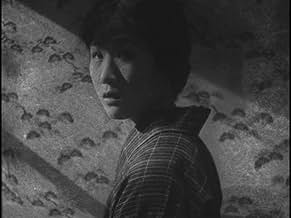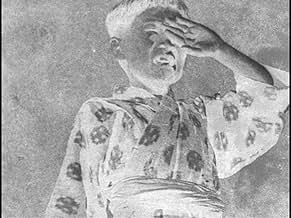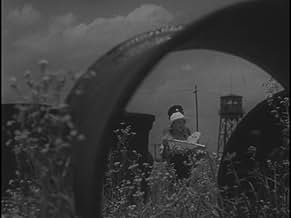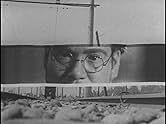Ajouter une intrigue dans votre langueThe story of a poor insurance salesman who struggles to provide for his wife and family.The story of a poor insurance salesman who struggles to provide for his wife and family.The story of a poor insurance salesman who struggles to provide for his wife and family.
Avis à la une
In his earliest surviving work, this 29 minute short, Naruse juggles comedy, financial hardship, and some tough emotions centered on children - not being able to provide as good a life for them because you're struggling with money, even if that just means not being able to give them an occasional toy, and what it would mean if something were to ever happen to them, which is every parent's worst nightmare. There's clearly humanism here but I don't think this really excelled in any of the tones it takes, and you can see the twist coming. Also, the two insurance agents about to come to blows over who gets to sell a life insurance policy for children is hard to empathize with; guys, you're both shady to me.
"Koshiben Ganbare" by Mikio Naruse is a Japanese short film also known as "Little Man, Do Your Best" or "Flunky, Work Hard!" in English. Although in some ways it's a comedy, it's really more a slice of life film showing how some folks were living in the countryside back in 1931.
This is the story of a very timid insurance salesman. He isn't doing particularly well at his job and he has two additional problems which make all this worse. First, his wife nags him to work harder. Second, his son has gotten into a lot of fights with the neighbor kids and he's afraid his son will cost him sales. After all, who wants to buy insurance from the father of the neighborhood bully. But neither problem really is as it seems. The wife, though nagging at times, does seem to be a good wife and mother. And, the boy is fighting...but he is provoked into it and is only standing up for himself. So how does all this work out? See the film.
I look at this short as more a glimpse into Japan and the people of the country back in the 30s. While much of history focuses on Japanese militarism during this time, it's also interesting just to see normal folks going about their lives like they do in this cute film.
By the way, the story was filmed very well with some very nice camerawork. Too bad the final couple minutes of the story are seriously degraded and you focus on this instead of how great the picture originally looked.
This is the story of a very timid insurance salesman. He isn't doing particularly well at his job and he has two additional problems which make all this worse. First, his wife nags him to work harder. Second, his son has gotten into a lot of fights with the neighbor kids and he's afraid his son will cost him sales. After all, who wants to buy insurance from the father of the neighborhood bully. But neither problem really is as it seems. The wife, though nagging at times, does seem to be a good wife and mother. And, the boy is fighting...but he is provoked into it and is only standing up for himself. So how does all this work out? See the film.
I look at this short as more a glimpse into Japan and the people of the country back in the 30s. While much of history focuses on Japanese militarism during this time, it's also interesting just to see normal folks going about their lives like they do in this cute film.
By the way, the story was filmed very well with some very nice camerawork. Too bad the final couple minutes of the story are seriously degraded and you focus on this instead of how great the picture originally looked.
This, the earliest surviving Naruse picture, is not the sort of woman's picture he is best remembered for directing in the 1950s and 1960s, but a comedy about a timid insurance agent, henpecked at home, who can't seem to get ahead, even with his children watching. Thematically it is a great deal like Ozu's early comedies, but while Ozu's attitudes and rhythms are modern and American in this period, like a Japanese Leo McCarey, Naruse's choices seem much more foreign to this modern American viewer: a talent of Japanese, rather than world cinema. Still, the worries are universal in a modern age, of the wage slave who makes himself ridiculous in order to keep his head above water, and the particularly Japanese take on the themes is refreshing. Ozu is outraged at injustice. Naruse's hero endures.
There is a melancholy air to the cinematography as images and the detritus of a still-industrializing Japan are seen about. The children play around and are shot through unassembled sewer pipes, trains rattle by in the background and a toy plane is a plot point. The hard-working, loyal flunky is in danger of being lost, and only the occasional, graceful tracking shot of him walking with his boy offers any real consolation.
There is a melancholy air to the cinematography as images and the detritus of a still-industrializing Japan are seen about. The children play around and are shot through unassembled sewer pipes, trains rattle by in the background and a toy plane is a plot point. The hard-working, loyal flunky is in danger of being lost, and only the occasional, graceful tracking shot of him walking with his boy offers any real consolation.
Le saviez-vous
- Versions alternativesThere is an Italian edition of this film on DVD, distributed by DNA srl, "SOGNI DI UNA NOTTE (Yogoto no yume, 1933) + OMETTO, FAI DEL TUO MEGLIO! (Koshiben ganbare, 1931) + LE APPARENZE DI GINZA (Ginza Cosmetics, 1951)" (3 Films on a single DVD), re-edited with the contribution of film historian Riccardo Cusin. This version is also available for streaming on some platforms.
Meilleurs choix
Connectez-vous pour évaluer et suivre la liste de favoris afin de recevoir des recommandations personnalisées
Détails
- Date de sortie
- Pays d’origine
- Langues
- Aussi connu sous le nom de
- Flunky, Work Hard!
- Société de production
- Voir plus de crédits d'entreprise sur IMDbPro
- Durée29 minutes
- Couleur
- Mixage
- Rapport de forme
- 1.37 : 1
Contribuer à cette page
Suggérer une modification ou ajouter du contenu manquant

Lacune principale
By what name was Bon courage, larbin! (1931) officially released in Canada in English?
Répondre


















